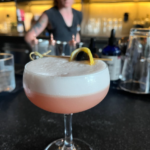By Katie Durant
Sometimes my mother crashed. She seemed to have left the house, but really, she buried herself in it, occupying the big bedroom, lying on the bed ensconced in a deep comforter. She went back to bed after we three left for our elementary and middle schools. Coming home not finding her but seeing the car outside, we called her and called louder until we heard her groggy voice drift down from the bed where she laid. These absences of hers eventually led to messes, unpaid bills, and a lack of food on the table and in the refrigerator. She was missing from the kitchen, living room, and hallways. She retracted from us, and we tried to pull her out by bringing her breakfast in bed, cleaning without being asked, and exaggerating our own happiness, feigning excitement. We smiled and told her jokes and stories from school, and while we had the convenience of coming and going without much interference, the house seemed empty and cold.
Sometimes when we came home from school, we would find her at the table crying into her arms. On those days, I would run to my room, open my closet, kneel on the floor, and reach into a hope chest under a pile of linens. There, I had a stack of pictures I had drawn: my mother on a whale watch or camping, with pink hearts and a rainbow in the clouds. Phrases like “I love you,” and “My Mom is the best,” spread across seascapes, mountains, and sky. I spent my free time fashioning these to ration them out later to my mother who used to pull me to her knee, this time not for spanking, but for a hug, thanking me for being thoughtful. Sometimes I only received dim thanks, and my mother would turn the page face down on the table.
If she was depressed, we’d stay out until after dark. We’d come in hungry, wondering why no one called us for dinner. At least when she was yelling, we knew she cared.
One late afternoon, I stood by her mattress on the floor asking her to cook for us. There was no dinner. Facing the wall, the comforter clutched up around her neck, she said she didn’t feel like cooking, she didn’t feel like doing anything. Andii and I stood quietly with our heads down, thinking of what to say next–not to extract a dinner from her, that now seemed impossible and unfair, but to lift her somehow, to lighten the weight pressing down on her, the weight pressing down on all of us.
We thought many of her lingering spells were caused by our own behavior, and we would change the way we acted to try to change her. When she was down, we would put on shows for my mother. Calling her into the bedroom, I tap-danced on the desk with everything I had learned in dance class, producing randomly strung together shuffles and sweeps of my arms. We would sit her in a dining room chair, and we would dance ballet or breakdance for her. We tied blankets around our throats, put socks on our hands and feet, and propelled ourselves through the kitchen and into the shared condominium wall at full speed, slamming into it again and again, looking to see if her despair had yet turned to amusement.
She would start out with her head resting on her fist, slouching to the side, and as the show went on, she might slowly unfold herself until she was upright. A few more rounds, another invisible banana peel on the kitchen floor, and if we were lucky, she would be laughing and clapping her hands. Her salt and pepper shaker collection clinked as the shelf shimmied. The neighbors were at the door banging, asking if we were okay. And though we knew we’d be bruised, we exulted over our mother’s happiness. We knew it was fleeting, it wouldn’t last long, but for the moment, we had won against our mother’s demons.








